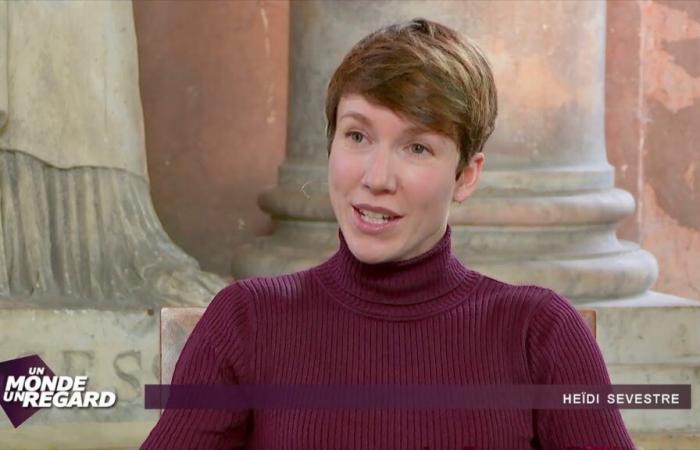
“I have difficulty finding the right words to say how terrible the situation is today,” confides Heïdi Sevestre. Her smile and sunny appearance contrast with the chilling news she has come to bring us. “I would like one day to be able to say: things are getting better, but the situation is apocalyptic,” underlines the glaciologist. Originally from Haute-Savoie, she took up residence in the Norwegian archipelago of Svalbard. A member of the Arctic Monitoring Council, she has a front-row seat to witness the effects of climate change on our poles.
“The sea ice is a stabilizer of the global climate. This white lid, in the middle of a dark ocean, reflects sunlight and returns 90% of its rays. It’s the best air conditioning on the planet, but it’s melting at both ends,” she explains. “In a few decades, it has lost 75% of its volume. It is possible that by 2040, we will experience the first summer months without ice floes. The melting of Greenland and the Arctic will cause 65 meters of sea level rise,” warns the scientist.
“Caen, New Aquitaine, Nice airport…our everyday life will be affected by Greenland and Antarctica”
When she talks to us about the state of the glaciers, Heïdi Sevestre talks to us about us. “Our everyday lives will be affected by Greenland and the Arctic,” she warns. “Greenland is three times the size of France. Antarctica, twenty-five times. It's hard to imagine how such distant regions can impact us. If we lose part of Greenland and part of Antarctica, Caen, New Aquitaine, Nice airport, the Netherlands, Bangladesh (…) the whole Earth will be impacted by that. » Europe should particularly be affected. “It is one of the fastest warming continents on Earth. It will become more and more violent and irreparable,” adds the glaciologist.
How to communicate such news for researchers? Heïdi Sevestre recognizes that the question is thorny. » As scientists, we are committed to disseminating knowledge. Not to annoy people, but to protect as many people as possible (…) It is important to continue to educate ourselves on the effects of climate change because without knowledge, we will make the wrong decisions,” emphasizes. She.
-“The transition will happen at the local level or it will not happen”
A glimmer of hope in the middle of this dark picture: mobilization at the local level. “I am one of those convinced that this great ecological transition will happen at the local level or will not happen,” declares Heïdi Sevestre, with her tireless optimism. “At the municipal level, we meet climate warriors everywhere in France, who take this subject head on. » Supporting example: the city of Caen.
“The city is working hard on the transition. She understood that we now had to anticipate the melting of Greenland and Antarctica, and its very concrete effects on the coastline, the rise in sea levels. »
Therefore, mobilize at the local level. And catch up with the “climate-jemenfoutists”, also recommends Heïdi Sevestre. “These are the people who have other things to do, other priorities, they are less interested in these subjects. They represent the soft underbelly of society. You have to be careful about it. One of my biggest challenges is figuring out how to go where you're not invited. There are areas where we don't realize what's going to happen. We have to manage to get everyone on board. It should be exciting to create a more desirable future.”
Watch the entire show in replay here.


